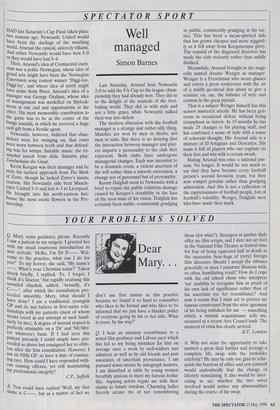SPECTATOR SPORT
Well managed
Simon Barnes
HAD last Saturday's Cup Final taken place two seasons ago, Newcastle United would have been the darlings of the watching world, Arsenal the cynical, unlovely villains. And either Newcastle would have won 5-0 or they would have lost 5-4.
Then, Arsenal's idea of Continental exoti- cism was a polite Norwegian, whose idea of grand aria might have been the Norwegian Eurovision song contest winner Diggi-loo, Diggi-lay', and whose idea of mirth might have come from Ibsen. Arsenal's idea of a manager was George Graham, whose idea of management was modelled on Shylock: mean at one end and opportunistic at the other. His most memorable contribution to the game was to be at the centre of the bungs scandal, in which he received a huge cash gift from a Nordic agent. Newcastle, however, believed that chan- deliers were for swinging on, that roses were worn between teeth and that defend- ing was for wimps. Suitable music: the tri- umphal march from Aida. Suitable play: Tamburlaine the Great.
Kevin Keegan was their manager and he stole his tactical approach from The Mark of Zorro, though he lacked Zorro's innate caution. His Newcastle side beat Manch- ester United 5-0 and lost 4-3 to Liverpool. He brought into his north-eastern hot- house the most exotic flowers in the Pre- miership. Last Saturday, Arsenal beat Newcastle 2-0 to add the FA Cup to the league cham- pionship they had already won. They did so to the delight of the neutrals of the foot- balling world. They did so with style and not a little grace, while Newcastle sulked their way into defeat.
The modern obsession with the football manager is a strange and rather silly thing. Matches are won by men in shorts, not men in suits. But there is no denying that the interaction between manager and play- ers imparts a personality to the club they represent. Both clubs have undergone managerial changes. Each was intended to be a dramatic event, a violent assertion of the will rather than a smooth succession, a change not of personnel but of personality.
Kenny Dalglish went to Newcastle with a brief to repair the public relations damage caused by Keegan's instability in the face of the near-miss of his vision. Dalglish has certainly been stable: consistently grudging in public, consistently grudging in his tac- tics. This has been a mean-spirited side that has grown cheaper and more niggard- ly as it fell away from Keeganesque glory. The scandal of the disgraced directors has made the club violently rather than mildly disliked.
Meanwhile, Arsenal brought in the magi- cally named Arsene Wenger as manager. Wenger is a Frenchman who wears glasses and enters a press conference with the air of a mildly go-ahead don about to give a seminar on, say, the balance of style and content in the great pursuit.
That is a subject Wenger himself has this season mastered utterly. He has been gen- erous in occasional defeat, without being triumphant in victory. In 19 months he has made 29 changes to his playing staff, and has combined a sense of style with a sense of coherent thought. His Arsenal side is a mixture of D'Artagnan and Descartes. His team is full of players who can cogitate on their feet and win with a certain swash.
Hating Arsenal was once a national pas- sion. No longer. It would be too much to say that they have become every football person's second favourite team, but they now compel genuine rather than grudging admiration. And this is not a reflection of the capriciousness of football people, but of football's volatility. Wenger, Dalglish: men who have made their mark.


































































 Previous page
Previous page